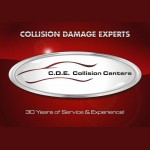Driving Assessments for Senior Drivers
For many of us, driving is a big part of our daily lives. However, as we age, some of the skills needed to be considered a safe driver can deteriorate. These include hearing, vision, flexibility and even reflexes. Here is some helpful information from CDE Collision Centers (South Western) for seniors and those that have seniors in their lives, whether it's here in Chicago or anywhere in IL.
If you're a senior, maybe you’ve experienced some near misses, you are noticing that your reactions are slower than they used to be, or family members have mentioned that it is time to stop driving. It might be worth considering a driving assessment by a professional.
Not only can an assessment help identify any changes, but it can also help you determine if it would be worthwhile to schedule specialized training to improve some of your driving skills.
Studies show that more crashes occur by drivers in their late 60s and early 70s and they continue to increase after age 75. It is expected that one in five drivers will be 65 or older by 2030, according to the American Automobile Association (AAA).
Assessments are conducted by trained instructors who are licensed by the state. AAA says there are two types of instructors:
Driving Skills Evaluators (DSE)
DSEs help determine where you need to improve in regard to driving and if further training is needed. If you feel your driving skills could use some help, a Driving Skills Evaluation might be the right path for you. AAA says it usually costs about $100-$200 for the evaluation and an additional $75-$150 per hour for additional training.
Occupational Therapist Driving Rehabilitation Specialists (OT-DRS)
OT-DRSs focus on services for those with specific medical conditions or disabilities. If you have physical or cognitive disabilities such as spinal cord injuries, dementia or mental health problems, you might want to set up a Clinical Driving Assessment. This includes a review of your medical history, a cognitive and on-road assessment and possible treatment. Typically, AAA says it costs $100-$400 plus an hourly rate for rehabilitation
By recognizing your limitations, you can address any shortcomings, which will help you make better decisions when you get behind the wheel and determine whether you need to find alternative transportation. Most importantly, it will help you stay safer on the road.
Sources: AAA, AARP and DMV.org



Social